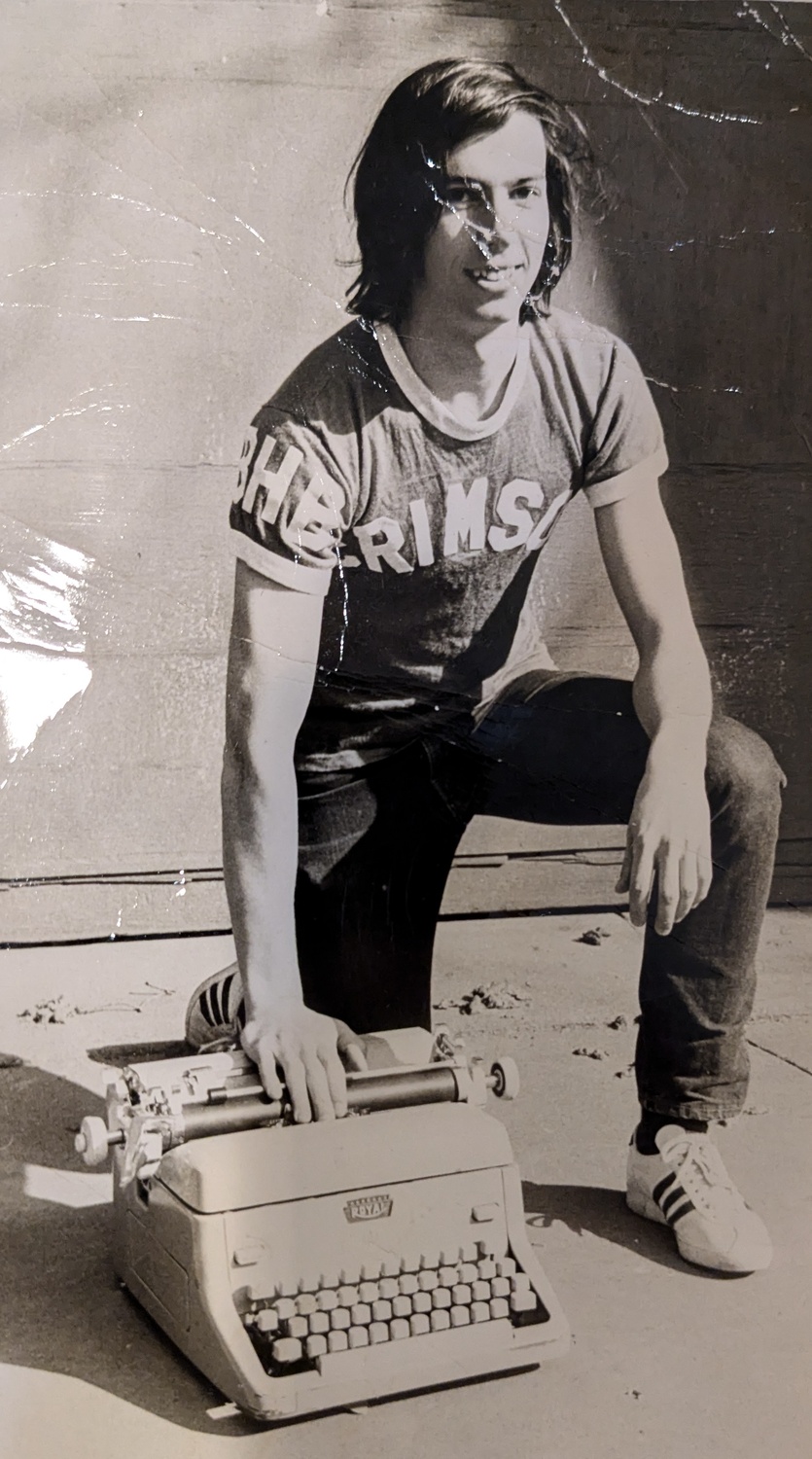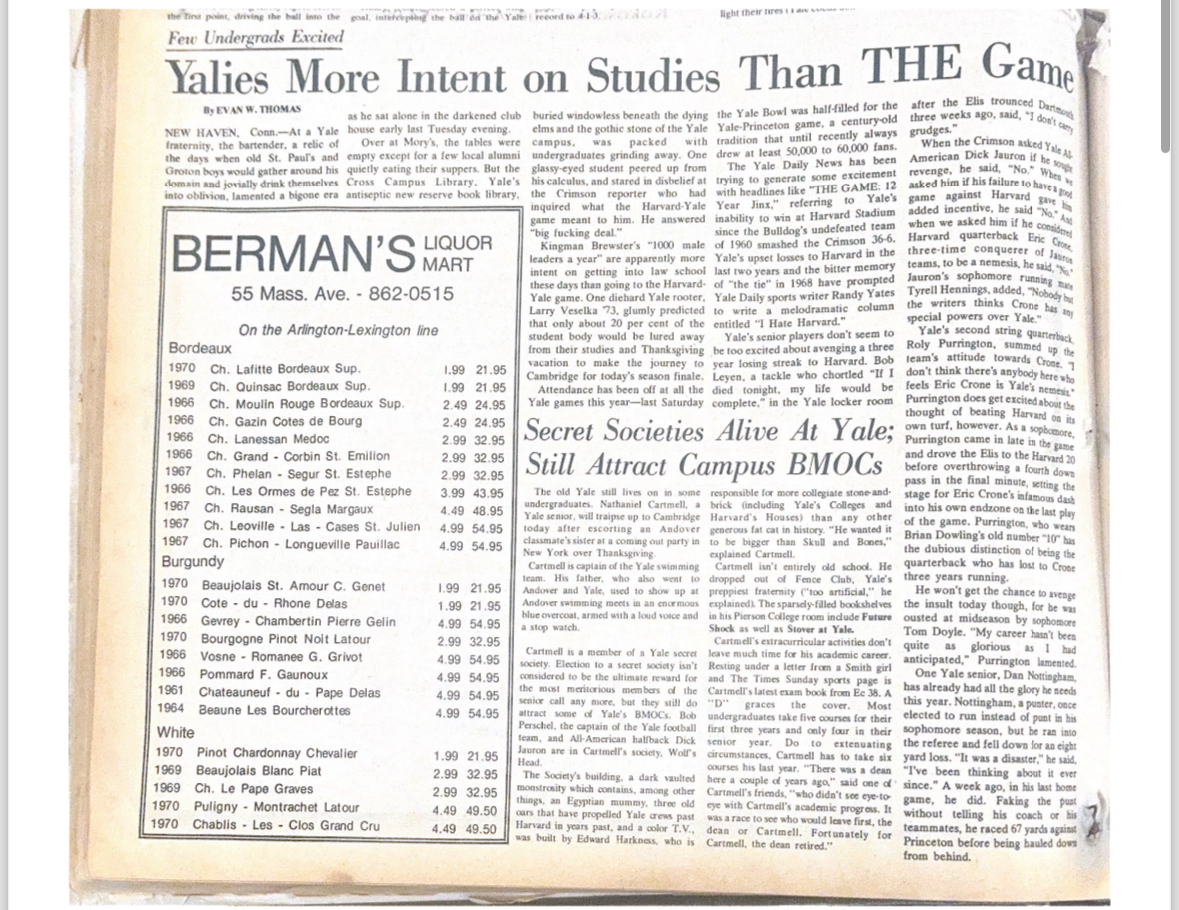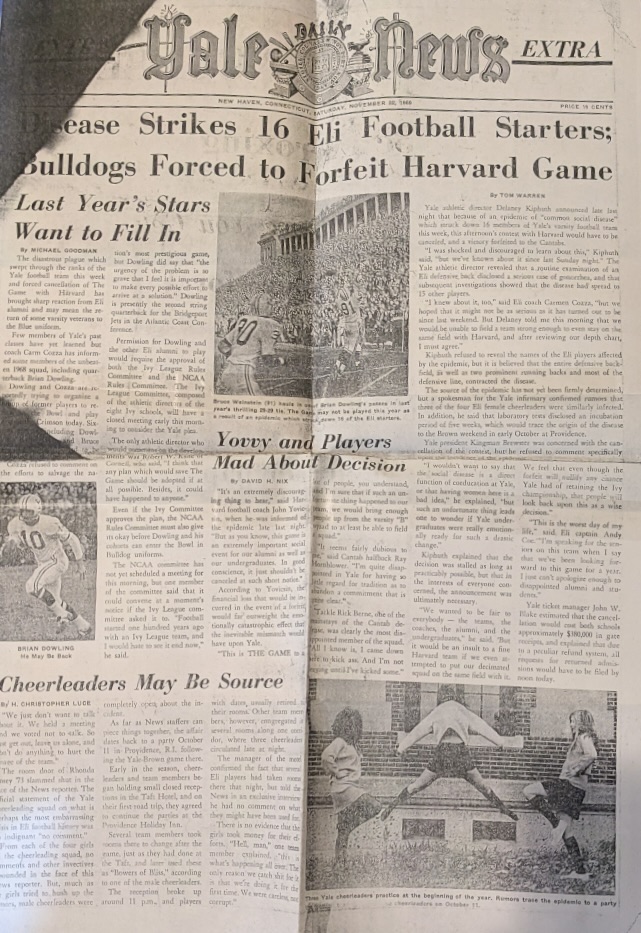
News
Harvard Researchers Develop AI-Driven Framework To Study Social Interactions, A Step Forward for Autism Research

News
Harvard Innovation Labs Announces 25 President’s Innovation Challenge Finalists

News
Graduate Student Council To Vote on Meeting Attendance Policy

News
Pop Hits and Politics: At Yardfest, Students Dance to Bedingfield and a Student Band Condemns Trump

News
Billionaire Investor Gerald Chan Under Scrutiny for Neglect of Historic Harvard Square Theater
The Inside Story: Harvard Crimson Beat Reporters Look Back on The Game

Everyone familiar with The Game knows that it is a time-honored tradition that celebrates the camaraderie of tens of thousands of Crimsonites and Yalies every year on the fateful Saturday before Thanksgiving.
But what does The Game represent to those on the inside? To those reporting on the inner workings of Harvard sports every day while on campus? To those who dedicated their most-fun four years to writing countless articles, laboring over how to accurately portray the nuance of a win or a loss? To those who dedicated every Friday and Saturday night to gaining the trust of their athletes and coaches and teams to represent Harvard athletics with grace and dignity?
By reminiscing about the days when they covered Harvard athletic programs, here we present the stories of four of our own alumni at The Crimson who pioneered the paper’s sports section. Looking back on their experience celebrating winning Harvard football teams and covering losing teams, these four reporters share why they eagerly await the glorious day year after year.
Evan W. Thomas III ’73
Thomas is a prominent journalist, historian, and author of 11 books — one of which he co-authored with Walter Isaacson ’74. Joining The Crimson his freshman year, Thomas began by covering the men’s ice hockey and football teams, as well as penning a regular column, “On the Bench.”
Beginning his reporting career at The Bergen Record before moving to Time Magazine and ultimately Newsweek — where he stayed for 24 years — Thomas quickly earned a reputation as a seasoned and honest reporter.
Later a member of the teaching staffs at Harvard and Princeton between 2003 and 2014, Thomas holds the unique position of having experienced the Harvard-Yale rivalry as a student, beat reporter, alumni, and faculty member.
“Well, I certainly loved the heart of the Harvard-Yale game,” Thomas quipped.
Something that makes Harvard-Yale weekend special for Thomas is that it is a remnant of an age in which football reigned supreme on the Harvard social calendar. He remembers the team selling out Harvard Stadium — which seats 40,000 comfortably — for the Harvard-Dartmouth game, which is astounding in comparison to the mere 4,000 people who were in attendance at the Yale-Dartmouth game at the Yale Bowl — which seats 60,000 — this season.
“We didn’t know who the game was going to get,” he said, of that time. “It felt like it mattered and it was big time.”
About the Harvard-Yale rivalry itself, Thomas jokingly said, “It’s a big alumni weekend and I think the kids, you guys, treat it as the one weekend a year where you can pretend to be actual college students and drink a lot and pretend that you go to Michigan.”
“You look at the Harvard student section and it will have 6, 7, 8, 10,000 people in it at the Harvard-Yale game,” he added. “In a regular game, 10 people.”
The first Ancient Eight rivalry, as Thomas points out, still carries the schedule: last year’s attendance was 51,127 — by far the most of any Harvard or Yale game all season.

Bennett “Ben” H. Beach ’71
Beach is a professional journalist and recreational runner, holding numerous running accolades including the most Boston Marathon finishes completed in less than two hours and 40 minutes, for which he is tied with long-distance runner John A. Kelley. Beach also at one time held the record for the most consecutive Boston Marathon finishes, with 54. Before his professional writing career, which included stints at several prominent publications from Time Magazine to USA Today, Beach learned the tricks of the trade while serving as the Sports Editor of The Crimson.
Beach’s love for sports doesn’t merely manifest in his numerous bylines floating through The Crimson’s archives — many of which are unattributed to him as his peers noted that he would often write under pseudonyms when articles went unclaimed, so as to not make the paper read as a one-man production — but also in his love for being present at each and every game.
“Harvard Stadium is just a special place,” he said.
While Beach revealed his fondness for the Stadium, he admitted that he loves going to most places where sporting events are held (even the Yale Bowl). Beach is known for having hosted a tailgate at The Game — whether it be at Harvard or Yale — every single year since his graduation from the College in 1971, and he has not missed a single game since 1966. What keeps him coming back?
“Well, it’s a great chance to see old friends,” he said. “Those of us who had a good experience at college love reliving that, sitting up in the stands and sort of thinking back to the days when we were students, and how much we enjoyed that.”
Outside of being a reunion, Beach also noted that on the Saturday before Thanksgiving, anything can happen out on the turf.
“The games are so unpredictable, that’s another feature of them,” he said. “And appreciating the tradition. We’ve been playing this game for so long, and it’s the game that caps off the season. And if you’ve had a poor season, and you can beat Yale, or beat Harvard if you’re the Yale team, then that’s a great moment.”
Robert P. “Bob” Marshall Jr. ’68
Marshall joined the Peace Corps upon graduation from the College where he taught English in Libya and Tunisia before returning to higher education at Columbia to earn his J.D. Upon his second graduation, Marshall joined Time Magazine as a lawyer, working his way through the ranks to assume the responsibilities of General Counsel. Never losing his passion for sports and sports writing, Marshall ingrained himself as an integral part of the Time staff, with his role extending far beyond the typical in-house counsel. He used the skills he learned as Sports Chair of The Crimson to help edit articles and field topic ideas.
Marshall published a book titled Diary of a Yankee-Hater in 1981 and subsequently helped edit a second book about Lawrence Park — his hometown in Westchester County, N.Y., now known as Bronxville — which was an artist’s colony turned Wall Street mavens’ homestead just 30 minutes outside of New York City. While Marshall has been highly accomplished since leaving 14 Plympton Street, the gravitas and tradition of Harvard-Yale weekend keeps him returning to campus year after year.
While the former Sports Editor, who mainly covered the soccer team for The Crimson, looks back fondly on the weekend, he admitted that an aspect of what got him and his peers excited was that “we were told it was important.”
“Alumni would come back, alumni would talk about it,” he added.
While The Game does receive a lot of external hype, Marshall said that what truly makes the game different is that fact that it “was really the only away game that a number of people would go to.”
John L. Powers ’70
Powers is fondly called the “dean of Olympic journalists.” He is the epitome of a die-hard sports fan. Powers, a long-time writer at the Boston Globe, has covered every Olympic games since 1976 — with the exception of the 1980 Summer Olympics in Moscow, when the U.S. boycott of the games led to the Soviet Union denying American reporters visas.
Powers attributes some of his success as the linchpin of American Olympics coverage to his work at The Crimson, where he was tasked with covering essentially every sport on Harvard’s roster. From writing detailed pieces about the crew teams’ regattas to features on the fencing team, Powers established himself as a nuanced weapon for the Globe’s sportswriting staff.
Acknowledging that his early years at the Globe were part of a golden age of sports journalism in which he garnered unparalleled access to different Boston teams — he was notably a primary reporter following the Boston Celtics for several years — Powers looks back on his time at The Crimson fondly. While he never covered The Game directly in his year on The Crimson’s staff, he certainly played a part in making the games during his tenure at 14 Plympton Street ones to remember.
Powers lauds the sportsmanship between the two teams that affords the players a level of mutual respect that distinguishes this particular football rivalry from any other.
“I remember the year before 29-29 in 1968,” he said.
“Yale had its breakup banquet the following Monday and they invited Vic Gatto, who was the next year’s captain to come down and talk,” he continued, referring to the hero of that epic contest, running back Victor E. “Vic” Gatto ’69.
“And Vic told me later, ‘Can you imagine that happening at any place where he wouldn’t be obnoxious?’” he added. “There is a respect level there that isn’t there for a lot of other rivalries.”
To Powers, what keeps fans coming back to The Game year after is not just the joy of reuniting with old peers, but the hearkening back to a time when The Game was the ultimate social event for an entire group of people along the eastern seaboard.
“A lot of it goes back to when it was an enormous social event, back before TV, back before Hollywood. They used to send reporters to Grand Central Station to see the Harvard and Yale fans coming back from New Haven” he said.
Powers recalled a story he had heard about a former Crimson football standout, George Owen Jr., Class of 1923.
“He made a run back of a punt,” he recounted. “He basically ran through the whole Yale team with the ball. So Harvard wins, and they all went down to New York, and they went to a vaudeville show that night. And I think one of the comedians, might have been Eddie Cantor, is running around the stage being chased by chorus girls, and he stops in the middle and he says ‘I’m George Owens at Yale Bowl.’”
“It had just happened that afternoon. Everybody knew about that,” he added.
The profound impact of The Game, even at a time without television and the luxury of instantaneous news, has not just influenced fans, it has also maintained a grip on national media outlets as well. Powers and Beach used that platform to their favor in a prank that went down in Crimson history.
It was a stunt so elaborate that several local and national news stations fell prey. Their trick? A YDN parody with the headline “Disease Strikes 16 Eli Football Starters; Bulldogs Forced to Forfeit Harvard Game,” accompanied by a subheading reading “Cheerleaders May Be Source.”

The reason the paper was such an outlandish ploy was this: 1969 was the first year Yale went co-educational, and the duo suggestively insinuated that the reason for the “cancellation” was the rampant spread of a venereal disease through the Yale bench as a result of the new fraternization.
To make the edition believable, the duo mimicked the typeface used on the YDN printing press and configured their spoof paper to mirror the Elis’ font, format, and style. They printed up thousands of copies of the paper, which they were set to deliver the morning of the game to Yale’s dormitories, colleges, and dining halls.
“Those were printed on Plympton Street and then one of the staffers ran them down to New Haven because we had been down there on Friday,” Powers remembered. “The Crimson played a touch football game against the Yalie Daily on the Old Campus.”
Before the runner was able to make his delivery, though, they needed to ensure sure the ruse was not immediately deniable. To do so, they infiltrated the YDN headquarters. Beach recalled sneaking into the Yale Daily News office the night before the game so that he might have unfiltered access to the building the next morning. Powers would join him by climbing through an unattended window that Beach left unlocked.
“I went down on Friday night, and I had gotten to know a couple of the staffers,” Beach said. “I went over there in the late afternoon and started hanging out. And then as they all were departing, they didn’t all leave at once, I just sort of squirreled myself away so they wouldn’t know I was still there.”
“They all left, locked the building, and I was in the President’s office. And then at about 5 or 6 a.m. John Powers arrived,” he continued.
In true Harvard fashion, they had thought through every possible hole in their plan. The pair called the wire service at the New York Times and the New Haven Register, amongst others, and told them that the game had been canceled. Beach would call and inform the papers, pretending to be the president of the YDN, and when the papers called for confirmation, Powers would slyly answer their phones and assuage their fears that they had been spoofed.
While the pair speak with glee about their most lasting memory of The Game, their prank also inspired a whole new class of Crimson writers to join the Sports Board. Thomas was so inspired by his predecessors after hearing the tale that he immediately knew he wanted to be part of the organization.
“I thought, ‘This is fun, I want to join The Crimson,’” he said. “And so I did.”
In fact, the staff was so inspired that it continued with the mischievous tradition during Thomas’s junior year, running a story which stated that the new city of New Haven had “condemned the Yale Bowl” to “create affordable housing” for the city.
From dastardly pranks to timeless tales to life-long friendships made along the way, these four writers provided coverage that can be summed up in one word: inspired. During their stints on The Crimson and in their professional writing, they’ve continued to channel the spirit of The Game to produce inspired coverage in places far afield from Cambridge and New Haven.
—Staff writer Katharine A. Forst can be reached at katharine.forst@thecrimson.com.
Want to keep up with breaking news? Subscribe to our email newsletter.
Related Articles
Most Read
- Harvard Kennedy School Dean Denounces Visa Revocations in Email to Affiliates
- Harvard Is Turning Its Back on Scholasticide in Palestine
- Harvard AAUP Sues Trump Administration To Stop $9 Billion Review of Harvard’s Federal Funding
- More Than $110 Million in NIH Grants to Harvard, Affiliated Hospitals Terminated Since Late February
- After Trump’s Demands, Dean of Students Says College Diversity Offices Have No Plans To Cut Programming
